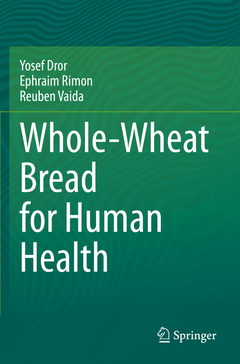Description
Whole-Wheat Bread for Human Health, 1st ed. 2020
Language: English
Subjects for Whole-Wheat Bread for Human Health:
Whole-Wheat Bread for Human Health
Publication date: 05-2021
Support: Print on demand
Publication date: 05-2021
Support: Print on demand
Whole-Wheat Bread for Human Health
Publication date: 05-2020
514 p. · 15.5x23.5 cm · Hardback
Publication date: 05-2020
514 p. · 15.5x23.5 cm · Hardback
Description
/li>Contents
/li>Biography
/li>Comment
/li>
This book examines the effect of whole-wheat bread on health, with evidence linking the consumption of whole-wheat products to a decrease in the relative risk of non-communicable diseases in comparison with products baked from refined flour. The authors focus on key areas such as milling and refining procedures, bakery products, and assessment of the present consumption of wheat products. They offer a detailed description of all available ingredients of wheat-kernel, with particular attention paid to the health benefits of wheat-kernel antioxidants and dietary fiber ingredients. Vitamins, glutathione, choline and betaine, carotenoids, sterols and stanols are covered, and the book concludes with a general overview of the effect of whole-wheat bread on colon activity and immune capacity. Methods of improving bread nutritional quality, and the potential for the upgrading of the nutritional qualities of whole-bread, are also discussed.
Consumption ofwhole-wheat in Western societies, however, has either not increased or increased very slightly. The authors intend for this book to highlight the health benefits of whole-wheat bread and the factors that contribute to these benefits.
The Intact Kernel.- Definitions.-The wheat in our menu.- Milling and Refining.- Kernel Composition.- Dietary Fiber.- Vitamins and Organic Micronutrients.- Methyl Donors.- Antioxidants.- Antioxidant capacity.- Covering layers.- Ingredients with opposite activity.- Wheat allergens.- Wide-scaled epidemiological studies.- Observational studies with limited data.- Intervention and biomarkers studies.- Animal experimentation.- Effect of whole-wheat on brain integrity.- Malpractice in bread baking.- Bread consumption versus other food items.- Bread baking.- The consumer preferences.- Population groups with particular needs.- The struggle for the increase of whole-wheat intake.
Yosef Dror, PhD Nutritionist, The School of Nutritional Sciences, The Faculty of Agriculture, The Hebrew University of Jerusalem, Israel
Efraim Rimon, MD Gastroenterologist, Head of the Gastro-Geriatric Unit, Kaplan-Harzfeld Medical Center, Israel
Reuben Vaida, BSc Food Technologist, Einat Food Industries Israel.
Examines the link between consumption of whole-wheat products and decreased relative risk of non-communicable diseases Provides a detailed description of all available ingredients of wheat-kernel collected from 175 publications and a comparison to the data available in USDA tables Evaluates the milling and refining procedures for whole-wheat flour in comparison to refined flour Assesses the present consumption of wheat products in Western societies Defines the qualities of superior bread baked from whole-wheat flour
© 2024 LAVOISIER S.A.S.




